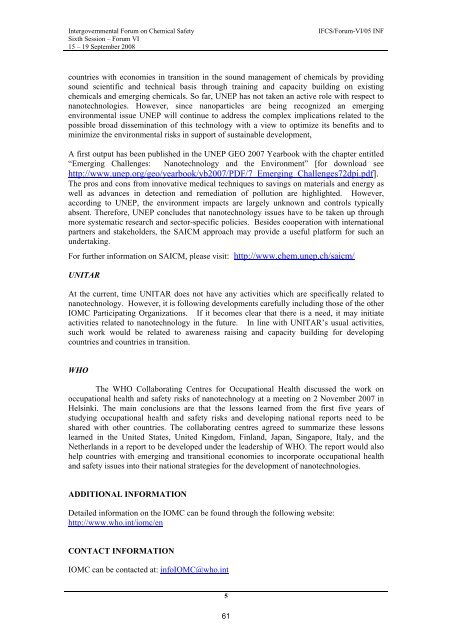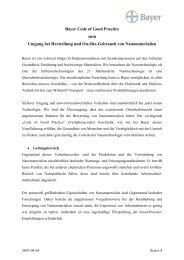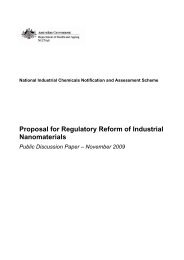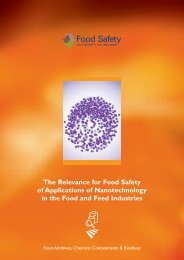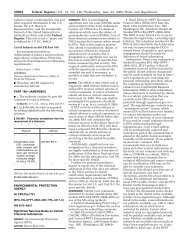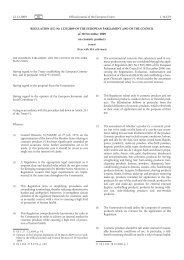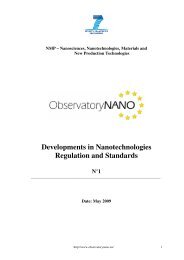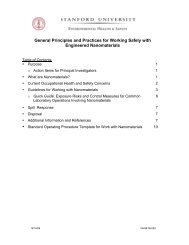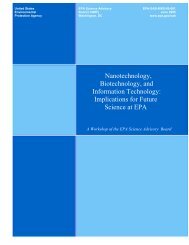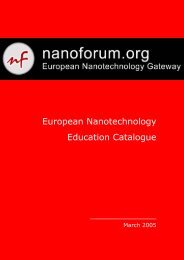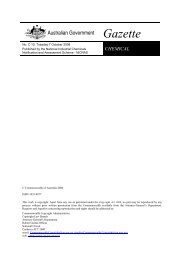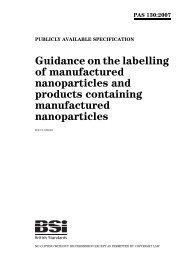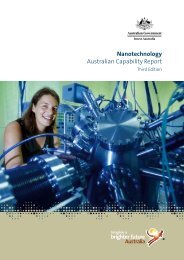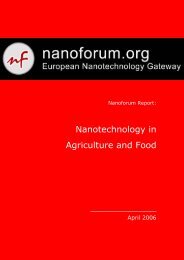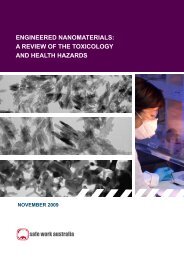Nanotechnology - Nanotech Regulatory Document Archive - Arizona ...
Nanotechnology - Nanotech Regulatory Document Archive - Arizona ...
Nanotechnology - Nanotech Regulatory Document Archive - Arizona ...
You also want an ePaper? Increase the reach of your titles
YUMPU automatically turns print PDFs into web optimized ePapers that Google loves.
Intergovernmental Forum on Chemical Safety<br />
Sixth Session – Forum VI<br />
15 – 19 September 2008<br />
5<br />
IFCS/Forum-VI/05 INF<br />
countries with economies in transition in the sound management of chemicals by providing<br />
sound scientific and technical basis through training and capacity building on existing<br />
chemicals and emerging chemicals. So far, UNEP has not taken an active role with respect to<br />
nanotechnologies. However, since nanoparticles are being recognized an emerging<br />
environmental issue UNEP will continue to address the complex implications related to the<br />
possible broad dissemination of this technology with a view to optimize its benefits and to<br />
minimize the environmental risks in support of sustainable development,<br />
A first output has been published in the UNEP GEO 2007 Yearbook with the chapter entitled<br />
“Emerging Challenges: <strong><strong>Nanotech</strong>nology</strong> and the Environment” [for download see<br />
http://www.unep.org/geo/yearbook/yb2007/PDF/7_Emerging_Challenges72dpi.pdf].<br />
The pros and cons from innovative medical techniques to savings on materials and energy as<br />
well as advances in detection and remediation of pollution are highlighted. However,<br />
according to UNEP, the environment impacts are largely unknown and controls typically<br />
absent. Therefore, UNEP concludes that nanotechnology issues have to be taken up through<br />
more systematic research and sector-specific policies. Besides cooperation with international<br />
partners and stakeholders, the SAICM approach may provide a useful platform for such an<br />
undertaking.<br />
For further information on SAICM, please visit: http://www.chem.unep.ch/saicm/<br />
UNITAR<br />
At the current, time UNITAR does not have any activities which are specifically related to<br />
nanotechnology. However, it is following developments carefully including those of the other<br />
IOMC Participating Organizations. If it becomes clear that there is a need, it may initiate<br />
activities related to nanotechnology in the future. In line with UNITAR’s usual activities,<br />
such work would be related to awareness raising and capacity building for developing<br />
countries and countries in transition.<br />
WHO<br />
The WHO Collaborating Centres for Occupational Health discussed the work on<br />
occupational health and safety risks of nanotechnology at a meeting on 2 November 2007 in<br />
Helsinki. The main conclusions are that the lessons learned from the first five years of<br />
studying occupational health and safety risks and developing national reports need to be<br />
shared with other countries. The collaborating centres agreed to summarize these lessons<br />
learned in the United States, United Kingdom, Finland, Japan, Singapore, Italy, and the<br />
Netherlands in a report to be developed under the leadership of WHO. The report would also<br />
help countries with emerging and transitional economies to incorporate occupational health<br />
and safety issues into their national strategies for the development of nanotechnologies.<br />
ADDITIONAL INFORMATION<br />
Detailed information on the IOMC can be found through the following website:<br />
http://www.who.int/iomc/en<br />
CONTACT INFORMATION<br />
IOMC can be contacted at: infoIOMC@who.int<br />
61


